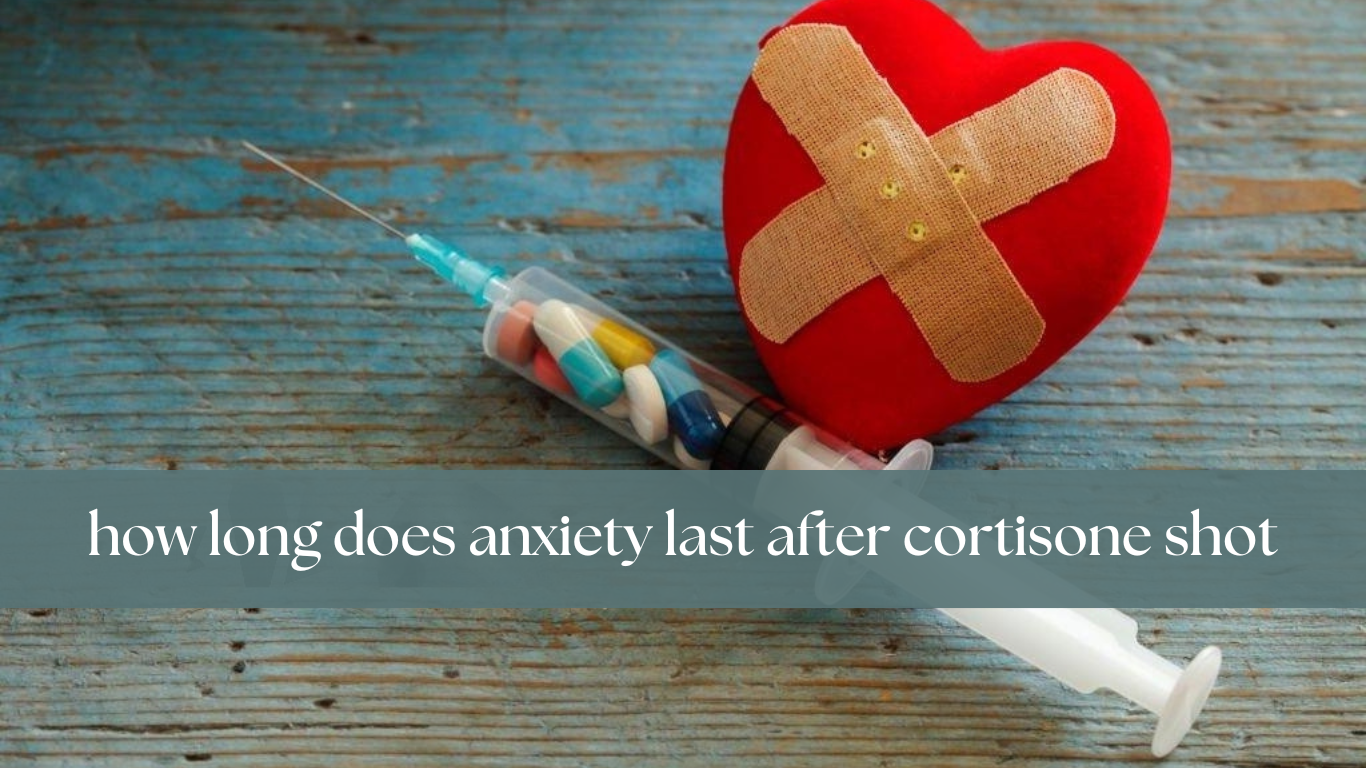Cortisone injections are a common treatment for inflammation and pain, especially for conditions like arthritis and tendonitis. Although effective, cortisone shots can cause several side effects, including anxiety. If you’ve ever experienced anxiety after receiving a cortisone injection, you’re not alone. Understanding how long anxiety may last and why it happens is crucial for both patients and healthcare providers.
how long does anxiety last after cortisone shot?
In this article, we’ll explore the connection between cortisone shots and anxiety, how long these feelings may linger, and what you can do to manage them.
What is a Cortisone Shot?
Cortisone is a type of corticosteroid, a class of drugs that reduce inflammation by mimicking hormones produced by your adrenal glands. These injections are commonly used to treat joint inflammation, tendonitis, bursitis, and other musculoskeletal conditions.
When injected into the affected area, cortisone acts quickly to reduce swelling, pain, and redness. However, while the benefits are often immediate, some individuals may experience side effects, including anxiety.
Why Do Cortisone Shots Cause Anxiety?
Cortisone shots can sometimes cause anxiety due to their impact on the body’s hormone levels, particularly cortisol. Cortisol, often referred to as the “stress hormone,” is naturally produced by the adrenal glands and is responsible for regulating stress responses. When cortisone is introduced into the system, it can raise cortisol levels, leading to an increase in anxiety, mood swings, and nervousness.
The synthetic nature of cortisone can make the body react as though it’s under stress, even if no external stressors exist. This hormonal imbalance is often the root cause of anxiety and other mood-related side effects.
How Long Does Anxiety Last After a Cortisone Shot?
The duration of anxiety after a cortisone shot can vary depending on several factors:
1. Individual Sensitivity: Some people are more sensitive to corticosteroids, which can make their anxiety last longer.
2. Dosage: Higher doses of cortisone may cause more intense or prolonged anxiety.
3. Overall Health: People with pre-existing anxiety disorders or those prone to stress may experience heightened or more lasting anxiety symptoms.
For most people, anxiety after a cortisone shot tends to last anywhere from a few hours to a few days. In rare cases, it can last up to a week or more, especially if the body takes longer to metabolize the drug.
What Other Side Effects Can Cortisone Shots Cause?
Apart from anxiety, cortisone shots can lead to various other side effects:
Physical Side Effects: Temporary weight gain, increased appetite, high blood pressure, or water retention.
Emotional Effects: Irritability, mood swings, or even depression can accompany feelings of anxiety.
Sleep Disturbances: Many patients report difficulty sleeping after receiving a cortisone injection.
The severity and type of side effects vary from person to person, but anxiety remains one of the more concerning psychological effects.
Who is Most Likely to Experience Anxiety After a Cortisone Shot?
While anyone can experience anxiety after a cortisone shot, certain individuals may be at higher risk:
People with Anxiety Disorders: If you already suffer from anxiety or panic attacks, you’re more likely to experience heightened anxiety after a cortisone injection.
Older Adults: The elderly may have a heightened sensitivity to medications, including corticosteroids, leading to increased anxiety.
People with High Cortisol Levels: Those with naturally high cortisol levels or a history of adrenal problems may be more affected by cortisone.
Cortisone and the Nervous System: A Closer Look
Cortisone’s impact on the brain is complex. It interacts with various neurotransmitters and hormones, such as serotonin and cortisol, both of which play a role in mood regulation. When cortisone spikes cortisol levels, it can create a fight-or-flight response, making individuals feel anxious, jittery, or even panicked.
Some scientific studies show that corticosteroids like cortisone can affect brain chemistry, leading to psychological effects such as anxiety, confusion, or even cognitive changes.
Managing Anxiety After a Cortisone Shot
If you experience anxiety after a cortisone shot, several strategies can help manage the symptoms:
1. Deep Breathing and Relaxation Techniques: Practice mindfulness or meditation to calm your nervous system.
2. Stay Active: Light exercise can help release endorphins, which counteract anxiety.
3. Talk to Your Doctor: If anxiety persists, consult your healthcare provider. They may adjust your dosage or prescribe anti-anxiety medications to help manage symptoms.
When Should You Worry About Anxiety After a Cortisone Shot?
While anxiety is a common side effect, it’s usually short-lived. However, if the anxiety lasts for more than a week, is severely impacting your daily life, or is accompanied by other severe side effects (such as chest pain or suicidal thoughts), it’s essential to contact your doctor immediately. In rare cases, corticosteroid-induced psychosis may occur, requiring prompt medical attention.
Preventing Anxiety Before and After a Cortisone Shot
Prevention is key. Here are a few tips to minimize anxiety before and after the shot:
Communicate with Your Doctor: If you’ve had anxiety after cortisone shots in the past, let your doctor know. They might adjust your treatment plan accordingly.
Prepare Mentally: Engage in relaxation exercises before the injection to put your mind at ease.
Consider Alternatives: Discuss non-steroidal options with your healthcare provider if cortisone-related anxiety is a major concern for you.
Can Cortisone Injections Trigger Anxiety in People with Anxiety Disorders?
Yes, cortisone shots can exacerbate anxiety in individuals with pre-existing anxiety disorders. If you have generalized anxiety disorder (GAD), panic disorder, or another form of anxiety, you may need additional care when receiving cortisone injections. Managing your anxiety proactively with therapy, medications, or mindfulness practices can reduce the
chances of an extreme reaction.
Comparing Cortisone to Other Steroid Medications
Not all steroids cause the same side effects. Cortisone is one of many corticosteroids, and others, like prednisone or methylprednisolone, may have different impacts on mood and anxiety levels. Some patients report fewer psychological side effects with alternative steroid medications, though this varies.
Natural Alternatives to Cortisone Shots
If you’re wary of cortisone injections due to anxiety, there are natural anti-inflammatory alternatives:
Turmeric: Known for its anti-inflammatory properties, turmeric can be effective in managing pain.
Omega-3 Supplements: Fish oil supplements can help reduce inflammation naturally.
Physical Therapy: Non-drug treatments like physical therapy can also reduce inflammation without the side effects of cortisone.
Real Patient Experiences: Anxiety After Cortisone Injections
Many patients have shared their personal experiences with cortisone-induced anxiety. Some describe a brief period of jitteriness that subsides after a day, while others report prolonged episodes of anxiety lasting up to a week. Most agree that staying informed and practicing calming techniques can make a big difference in coping with the side effects.
Conclusion
Cortisone shots are an effective treatment for inflammation, but anxiety can be an unwanted side effect for some. While anxiety typically lasts only a few days, managing it effectively is crucial for overall well-being. By understanding why cortisone causes anxiety and knowing how to cope with the symptoms, you can make the experience more manageable. Always consult with your healthcare provider if anxiety becomes overwhelming or persistent.
FAQs
1. Can cortisone shots cause anxiety attacks?
Yes, cortisone shots can increase anxiety and, in some cases, may trigger anxiety attacks, especially in people prone to anxiety disorders.
2. How can I prevent anxiety before getting a cortisone shot?
Practice relaxation techniques, discuss concerns with your doctor, and consider possible anxiety treatments beforehand.
3. How long do side effects from cortisone shots last?
Most side effects, including anxiety, last from a few hours to a few days but may persist longer in some individuals.
4. What should I do if anxiety after a cortisone shot doesn’t go away?
Consult your healthcare provider if anxiety persists for more than a week or interferes with daily activities.
5. Are there alternatives to cortisone shots that don’t cause anxiety?
Yes, there are natural anti-inflammatory treatments and other medications that may not have the same anxiety-related side effects.

